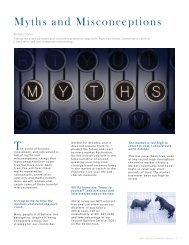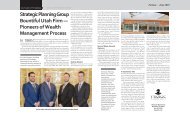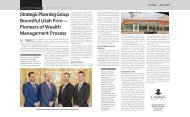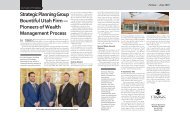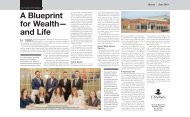Create successful ePaper yourself
Turn your PDF publications into a flip-book with our unique Google optimized e-Paper software.
C O N T E N T S<br />
Ryan Craner<br />
reminds us<br />
of American<br />
tradition. pg. 3<br />
pg. 3-4<br />
Remember Resolve,<br />
Remember the Sleeping Giant<br />
by Ryan Craner<br />
Ryan looks back at the past 20 years of<br />
events. Can we rise up from this pandemic?<br />
pg. 5-6<br />
How Bad is It?<br />
by John Park<br />
John shares some knowledge and advice as<br />
we work through a bear market correction.<br />
pg. 7-8<br />
Your Kids Aren't Poor<br />
by Tom Craner<br />
Tom teaches some ways to help your<br />
children be financially successful.<br />
pg. 9-10<br />
Too Old for Games?<br />
by Heather Cunningham<br />
Enjoy some word games while reminiscing<br />
about your childhood games and activities.<br />
pg. 11-13<br />
Bloomberg Businessweek<br />
<strong>Strategic</strong> <strong>Planning</strong> <strong>Group</strong> was featured in<br />
Bloomberg Businessweek.<br />
pg. 3<br />
Remember Resolve,<br />
pg. 14-15<br />
Meet the Team<br />
Introducing the new members of the office.<br />
Remember the Sleeping Giant<br />
S T R A T E G I C P L A N N I N G G R O U P | 2
Remember Resolve,<br />
Remember the Sleeping Giant<br />
By Ryan Craner<br />
Taking the client advocate and consumer approach, Ryan has always viewed every client as<br />
a long-term and very important relationship.<br />
I t’s the year <strong>2020</strong> and we<br />
start out with a hopecrushing,<br />
scary pandemic<br />
crisis and a 5.7 magnitude<br />
earthquake in Utah, followed<br />
by dozens of powerful<br />
aftershocks that last over a<br />
month. I want to remind you<br />
that it was just 20 years ago<br />
that we faced down another<br />
mysterious crisis, famously<br />
known as Y2K. The inevitable<br />
2-digit year vs 4-digit year<br />
coding “problem” that was to<br />
occur in all computer chips<br />
and software at the turn of<br />
the century. There was panic<br />
and concern that machines<br />
and computers would<br />
mistakenly think it’s the year<br />
1900 instead of the year<br />
2000. There were predictions<br />
that your bank accounts<br />
would disappear, planes<br />
would fall from the sky, and<br />
toasters would burn your<br />
toast. Digital mayhem was to<br />
ensue at the stroke of<br />
midnight on January 1, 2000.<br />
It may seem trivial now, but<br />
there were people hiding in<br />
bunkers and many prophesied<br />
the “end of the world” was at<br />
hand.<br />
If you recall, in years leading<br />
up to Y2K, every man, woman,<br />
and child on the planet, every<br />
corporation, every government,<br />
every organization all bought<br />
new software and computers<br />
in order to solve the problem.<br />
It must have worked because<br />
the predicted disaster never<br />
happened. What did happen<br />
was that every man, woman,<br />
and child, every government,<br />
and every organization<br />
suddenly stopped spending<br />
on computers and software<br />
once the year turned 2000.<br />
With disaster averted, there<br />
was a sudden halt to spending<br />
and this did create a very real<br />
crisis, the largest tech crash in<br />
history. Tech stocks cratered<br />
in March of 2000 and dread and<br />
anxiety enveloped the markets.<br />
If that was not enough, several<br />
short months later America was<br />
entrenched in an election<br />
dispute. Remember the<br />
Hanging Chads in Florida? We<br />
all went out and voted in the<br />
presidential election between<br />
George W. Bush and Al Gore,<br />
but we didn’t know who won<br />
until late December after many<br />
re-counts and a supreme court<br />
ruling. This made the already<br />
recessionary economy even<br />
more uncertain. Ultimately,<br />
George W. Bush was sworn<br />
into office on January 20, 2001.<br />
STRATEGIC PLANNING GROUP 3
Eight short months later,<br />
America sustained its worst<br />
terrorist attack in history on<br />
September 11, 2001. Many of<br />
you may recall that feeling of<br />
crisis and doom, we were<br />
attacked. We were in<br />
recession. Planes were not<br />
flying, fear was in the air, and<br />
markets were closed and<br />
tumbling. Nobody felt safe.<br />
and time again. When<br />
challenged and crisis ensues,<br />
we have an uncanny way of<br />
responding and defeating<br />
great peril and hardship. I will<br />
always remember the comment<br />
about America after the attack<br />
on Pearl Harbor, from our<br />
enemy at the time, Admiral<br />
Yamamoto of the Japanese<br />
Naval Forces. He said, “I fear<br />
all we have done is to awaken a<br />
sleeping giant and fill him with<br />
a terrible resolve.” That quote<br />
perfectly demonstrates the<br />
nature of the American<br />
people.<br />
Another example of American<br />
greatness is the story of Jonas<br />
Salk, a New Yorker and an<br />
amazing Patriot. His brilliant<br />
research and resolve brought<br />
us the polio vaccine, which<br />
effectively stopped a terrible<br />
disease and changed the<br />
world.<br />
I want to remind all of you that<br />
those uniquely American<br />
examples of human spirit and<br />
the accomplishments of<br />
invention and perseverance are<br />
not gone. The American<br />
tradition of compassion and<br />
RESOLVE is alive and well.<br />
The American<br />
tradition of<br />
compassion and<br />
RESOLVE is alive<br />
and well.<br />
We recovered and<br />
our society, while<br />
shaken, returned<br />
to normal.<br />
I remind you of this time<br />
period, not just to reminisce,<br />
but to highlight the fact that<br />
we recovered and our society,<br />
while shaken, returned to<br />
normal. America adapted and<br />
overcame those huge<br />
challenges. We flew on planes<br />
again, people traveled, the<br />
economy recovered, our<br />
psyche recovered. The Nation<br />
recovered.<br />
Looking back through the<br />
decades of our country’s<br />
history, there are many<br />
examples of American<br />
exceptionalism and that<br />
amazing human spirit. It is<br />
easy to see the way Americans<br />
triumph over adversity, time<br />
I think of NASA and the<br />
American Space Program and<br />
the truly miraculous stories of<br />
deadlines, setbacks, and the<br />
amazing sounds and images.<br />
On July 20, 1969, Neil<br />
Armstrong uttered those<br />
long-awaited words, “Houston,<br />
Tranquility Base here. The<br />
Eagle has landed.” Hundreds<br />
of NASA engineers and tech<br />
staff in Houston jumped up<br />
and down and cheered! Six<br />
and a half hours later, Neil<br />
Armstrong became the first<br />
man to step foot on the moon<br />
and we heard those famous<br />
words, “That’s one small step<br />
for man, one giant leap for<br />
mankind.”<br />
Looking back to all those<br />
events, and specifically Y2K<br />
and 9-11, just 20 years ago, it<br />
encourages me and comforts<br />
me with the knowledge that we<br />
will beat the COVID-19 crisis.<br />
We are Americans and we will<br />
rise up stronger than we were<br />
before and return to the<br />
country and society we have<br />
always known, strong, resilient,<br />
and full of RESOLVE.<br />
...Strong, Resilient,<br />
and Full of RESOLVE.<br />
President Andrew Jackson once<br />
said, “Americans are not a<br />
perfect people, but we are<br />
called to a perfect mission.”<br />
Our country has a mission in<br />
front of us now. American<br />
ingenuity will prevail and soon<br />
this crisis will be yet another<br />
human triumph!<br />
STRATEGIC PLANNING GROUP 4
How Bad is It?<br />
By John Park<br />
From Investments to complicated retirement strategies, John works to educate and advise his<br />
clients on making smart financial decisions.<br />
range of a high of 29,568.57<br />
and a low of 18,213.65. That<br />
is a peak to trough drop of<br />
38.40%! The S&P 500 dropped<br />
35.41%. The NASDAQ dropped<br />
Our investment models<br />
are designed to fair<br />
better than the general<br />
indexes.<br />
A s you are aware, we have<br />
been dealing with a bear market<br />
correction for several weeks now.<br />
The coronavirus has caused quite<br />
a scare. At first it seemed<br />
overreacted to and there<br />
wouldn’t be much of an<br />
economic impact, however, it<br />
eventually turned into actual<br />
economic impact, which<br />
we are still dealing with.<br />
This has been understandably<br />
stressful to us and to our<br />
clients. It is not fun to see<br />
this kind of a bear market.<br />
Here is some good news<br />
though: as of writing this<br />
article, the Dow is sitting at<br />
24,331.32. It has almost<br />
recovered half of the drop.<br />
Even better, the NASDAQ and<br />
S&P 500 are more than<br />
halfway back from their lows.<br />
We have definitely made some<br />
progress, but we are not quite<br />
back all the way.<br />
As we have discussed in the<br />
Ryan Reports and one-on-one<br />
with many of you, our<br />
investment models are<br />
designed to fair better than<br />
the general indexes. By<br />
favoring certain sectors, such<br />
as healthcare,<br />
communications, and<br />
technology, we believe our<br />
conservative, moderate, and<br />
growth models are well<br />
positioned to accomplish this<br />
goal.<br />
During this bear market, I have<br />
seen some people have<br />
There has been a consistent<br />
barrage of negative news,<br />
especially when it comes to<br />
the markets. We mostly hear<br />
about the Dow Jones market<br />
index, and boy it has been<br />
quite a ride! In March we<br />
would be down over 2,000<br />
points in one day, up again<br />
the next, and back down<br />
again. It was very volatile<br />
and dramatic. I started<br />
wishing for days where the<br />
market would only be<br />
negative a few hundred<br />
points instead of a few<br />
thousand. As of May 8, <strong>2020</strong>,<br />
we have had a Dow 52-week<br />
REMEMBER<br />
RESOLVE<br />
STRATEGIC PLANNING GROUP 5
the wrong perception of the<br />
nature of an investment<br />
portfolio. Some do not quite<br />
understand that an<br />
investment portfolio is not a<br />
nebulous value which<br />
mysteriously goes up and<br />
down. They also think the<br />
point is to get “lucky” by<br />
cashing out more than you<br />
started with. This is a way to<br />
view gambling or speculation,<br />
not investing!<br />
I would like to remind you of<br />
the accurate, real-world<br />
nature of your investment<br />
portfolios. When you follow<br />
our advice of diversifying<br />
into quality, hand-picked<br />
investments, you own<br />
tangible assets which are<br />
chosen for their growth<br />
potential and/or ability to<br />
produce income<br />
over time. You are not<br />
holding some vague<br />
instrument which has an<br />
artificial value that may or<br />
may not go away. You own<br />
assets.<br />
I believe you should be<br />
possessive with these assets.<br />
I want you to acquire as many<br />
of them as possible and hang<br />
on to them. It may not be<br />
wise to sell them when they<br />
drop in value. If anything,<br />
you may want to buy more! If<br />
you cannot buy more, then<br />
hang tight when the value is<br />
down. Be possessive!<br />
It is during our working years<br />
we sacrifice to set money aside<br />
and buy investment assets.<br />
You worked hard for them. Do<br />
not give them away in a “fire<br />
sale.” I believe this simple<br />
concept and mindset are what<br />
separates wise investors from<br />
foolish investors. Those who<br />
are wise, make wise decisions.<br />
Even the wisest investors may<br />
be fearful or stressed at times.<br />
Checking those emotions and<br />
making good choices helps<br />
make the difference.<br />
If you are stressed,<br />
Just remember, it is<br />
not as bad as you<br />
might think.<br />
This correction can still be<br />
short-lived. No matter how<br />
long it takes, be possessive<br />
and wise with your<br />
investments. If you are<br />
stressed, just remember, it is<br />
not as bad as you might think.<br />
Please do not hesitate to call<br />
if you would like an individual<br />
report on your accounts. We<br />
are always here to help!<br />
STRATEGIC PLANNING GROUP 6
Your Kids Aren’t Poor<br />
By Tom Craner<br />
With client relations and customer service experience going back nearly a decade, Tom has a proven<br />
track record of genuine care for his clients.<br />
K ids. We have them<br />
while we are young and just<br />
figuring things out ourselves.<br />
We are figuring out how to<br />
navigate the world and how to<br />
provide, teach, and care for<br />
our kids. We are figuring out<br />
the difference between<br />
discipline and punishment,<br />
between negligence and<br />
allowing them to learn a<br />
valuable lesson. As we grow<br />
older, our kids do too. Before<br />
long, they are wanting to<br />
break free from our<br />
providence. For most parents,<br />
these bitter-sweet moments<br />
come too soon.<br />
Allowing children who have<br />
grown into independent<br />
individuals to leave your care<br />
is a great sacrifice for parents.<br />
That individual stands before<br />
you, a benefactor of all the<br />
wisdom, knowledge, and<br />
guidance you have offered<br />
and they no longer need your<br />
help. In fact, in many ways,<br />
they no longer benefit from it.<br />
One way parents can damage<br />
their adult children, as well as<br />
themselves, is through giving<br />
them too much financial<br />
support. As their parent, it<br />
has been your job to make<br />
them secure for almost two<br />
decades. Now, when the<br />
stakes are highest, it can feel<br />
like you have no choice<br />
except to help them when<br />
they ask for money. I am here<br />
to tell you that you are not<br />
doing them any favors.<br />
If you have experience with a<br />
child who has struggled to cut<br />
their financial dependence,<br />
you may have already thought<br />
about this dilemma. The<br />
question is usually how? How<br />
do you tell your child that you<br />
cannot help them with their<br />
financial woes, when you can?<br />
How do you explain to them<br />
that not helping them with<br />
money is how you can help<br />
them the most?<br />
Not helping them with<br />
money is how you can<br />
help them the most.<br />
How you handle this situation<br />
all depends on the context.<br />
There are three phases of adult<br />
child dependency. The first is<br />
the Golden Moment, the<br />
second is the Intermittent<br />
Phase, and the third is the<br />
Consistent Phase.<br />
During the Golden Moment,<br />
your child has not yet, as an<br />
adult, begun to ask for money,<br />
but because of their naivety,<br />
they will very likely make a<br />
financial mistake that leads<br />
them into dire straits. When<br />
they come asking for money,<br />
tell them you are happy to<br />
support them and help them,<br />
but they will owe you. Have<br />
them draw up a loan contract<br />
and charge them interest.<br />
Alternatively, tell them that<br />
they are welcome to move back<br />
home.<br />
The truth is, they are likely<br />
encountering the first financial<br />
panic they have ever felt. They<br />
think they need your help<br />
because you have always been<br />
there. In reality, they just<br />
need to sleep on it, wake up<br />
the next morning and work an<br />
extra shift, donate plasma, sell<br />
something they own, or simply<br />
STRATEGIC PLANNING GROUP 7
go overdue on a payment and<br />
work it out from there. By<br />
taking this approach during<br />
the Golden Moment, your<br />
child will understand that<br />
they are truly on their own<br />
and they need to act<br />
accordingly.<br />
pay the late fees, eat rice for<br />
dinner, sell something, and<br />
cancel their Netflix and Hulu<br />
subscriptions. Like anything<br />
in life, they will figure it out<br />
through necessity and<br />
ultimately, be more effective<br />
with their finances.<br />
are to be removed from any<br />
other financial support(phone<br />
bills, insurance, etc).<br />
Some of you might have<br />
missed the opportunity in the<br />
Golden Moment and entered<br />
into the Intermittent Phase.<br />
This is when your child calls<br />
every few months asking for<br />
money. At this point, they<br />
have it in their head that if<br />
they get into financial trouble,<br />
they are one panicked phone<br />
call away from solving their<br />
problem.<br />
Like anything in life,<br />
they will figure it out<br />
through necessity...<br />
The solution here is to wait<br />
until they call exclaiming they<br />
are up to their eyeballs in<br />
debt, with no money to cover<br />
the bills. At this point you<br />
must be stern like you once<br />
were with them as a teenager.<br />
Tell them they will have to<br />
Follow up with them, help<br />
advise them, but make it clear<br />
they are now financially<br />
independent. They might be<br />
stressed, but in the end they<br />
will understand and accept it.<br />
Before long, they will thank<br />
you for it.<br />
The third phase is the<br />
Consistent Phase. During this<br />
period, they have already<br />
been asking for money for<br />
years. Now they are simply<br />
relying on you to pay part of<br />
their rent or mortgage. Their<br />
car maintenance is always<br />
your concern and they “really<br />
just need a little extra this<br />
month”, every month. In this<br />
situation you must sit them<br />
down. Tell them you are<br />
unable to continue<br />
supporting them for much<br />
longer and set a date where<br />
the money stops. Set another<br />
date, further out, where they<br />
Don’t let them think,<br />
not even for a second,<br />
that their financial<br />
mistakes are your<br />
financial responsibility.<br />
Set the expectation that if they<br />
get into trouble and they have<br />
more debt and bills than they<br />
can handle, that bankruptcy<br />
will be their only recourse.<br />
This way they never again will<br />
make the mistake of thinking<br />
they can come to you<br />
regarding extra money.<br />
Of course, during their hardest<br />
times, you can offer your<br />
children support in other ways.<br />
Invite them to come for dinner<br />
each night, offer them advice<br />
and ideas on how to lower the<br />
bills, send them job referrals,<br />
and always be willing to talk it<br />
through. Just don’t let them<br />
think, even for a second, that<br />
their financial mistakes are<br />
your financial responsibility.<br />
Billions of people live on less<br />
than two dollars a day in this<br />
world. Your child can go<br />
without a smart phone and<br />
avocado toast for a while until<br />
they sort out their finances.<br />
STRATEGIC PLANNING GROUP 8
Too Old for Games?<br />
By Heather Cunningham<br />
As a young child, running around<br />
without a care in the world was<br />
fabulous. When we look back to those<br />
days, there are many events that tend to<br />
flood our memories. Playing games<br />
would certainly be a top contender.<br />
Depending on the era that each of us<br />
were raised in could change the types of<br />
games that we played. They could be<br />
anywhere from hopscotch and jacks to<br />
Nintendo and Tetris.<br />
One thing that most of us probably had<br />
in common, regardless of the era we<br />
were raised in, was the desire<br />
to be grown up and older. As a child<br />
though, understanding the reality of<br />
what being a grown up meant was a<br />
foreign concept and not one that<br />
was easy to understand. Bills, yard<br />
work, careers, repairs,<br />
responsibilities, and more are not<br />
generally what we had in mind.<br />
Now that we are grown up, are we<br />
too old for games? Certainly not.<br />
Let's not forget to bring back the<br />
inner child in us. Here is a word<br />
game to get you started. Enjoy!<br />
1. A ______ is only as strong as its weakest link<br />
2. Absence makes the ______ grow fonder<br />
3. As clean as a ________<br />
4. As ______ as a cucumber<br />
5. You made your _____, now lie in it<br />
6. The pen is mightier than the _______<br />
7. Don’t put all your _____ in one basket<br />
8. Don’t throw the baby out with the _____ water<br />
9. All that ________ is not gold<br />
10. A friend in ______ is a friend indeed<br />
1.chain 2.heart 3.whistle 4.cool 5.sword 6.bed 7.eggs 8.bath 9.glitters 10.need<br />
S T R A T E G I C P L A N N I N G G R O U P | 9
The <strong>Strategic</strong> <strong>Planning</strong> <strong>Group</strong> Team (back row, left to right): Angeleah Jensen, John Park, Ryan Craner, Tom Craner, Alex Craner,<br />
and Kelsie Hanks (front row, left to right): Kelsey Park, Adrienne Prince, Jackie O’Shea, Heather Cunningham, and Jena Olney<br />
G N I N N A L P C I G E T A R T S S T T K K C X N<br />
R E M E M B E R R E S O L V E H R T B E N L O R D<br />
N S E C I V R E S T N E I L C E N N E K O I T V E<br />
C R I R R A D N E L A C T C E F R E P R I E L G N<br />
C L I E N T A D V O C A T E K E N M O A T C N R E<br />
V E A T N O E Y E T A D I R N U E T S M C G X E E<br />
C A T I T M V R M S O K A A O O O S S K U N R H A<br />
Y C I R H C C K E W B P R Y E F A E E C D N M T T<br />
F N O E R R R E J A N C K L I E T V S O E S E M E<br />
E E N M S A A O E H N N D A I S T N S T R A A G H<br />
T E V E I N N U O A A N C T S M C I I S X H I D T<br />
N M T N N E I J Y H O A R T S S E E V A A T U L C<br />
N T E T S R S R T G O L D E N M O M E N T T E M C<br />
Ryan Craner<br />
<strong>Strategic</strong> <strong>Planning</strong><br />
Investments<br />
John Park<br />
Retirement<br />
Stock Market<br />
Client Advocate<br />
Remember Resolve<br />
Be Possessive<br />
Golden Moment<br />
Perfect Calendar<br />
Client Services<br />
Tom Craner<br />
Tax Reduction<br />
Dow Jones<br />
Thank You<br />
STRATEGIC PLANNING GROUP 10
Now We Have Appeared In<br />
Bloomberg Businessweek<br />
The article will also be available on our blog:<br />
www.spgutah.com/blog<br />
S T R A T E G I C P L A N N I N G G R O U P | 11<br />
Bloomberg Introductory.indd 1<br />
3/31/<strong>2020</strong> 11:14:46 AM
Bloomberg Businessweek - June 2019<br />
SALT LAKE CITY FINANCIAL<br />
A Detailed Plan<br />
for Wealth —<br />
and Lifestyle<br />
Ryan Craner got his start working in his father’s insurance agency.<br />
In 1985 His father, James L. Craner, taught him well and mentored him<br />
on the importance of ethics and honesty. He was taught how to connect with clients<br />
and demonstrate that the client always comes first.<br />
At that time, the whole financial planning industry was going through many changes,<br />
and even though his father taught him well, Craner realized that there was a disconnect<br />
in being paid by commissions instead of directly by the client. He went to his father and<br />
various supervisors at insurance and investment companies and told them that he wanted<br />
to start his own firm and become a fee-only<br />
advisor. Doing this would help remove any<br />
For the forward-thinking<br />
advisors of <strong>Strategic</strong><br />
<strong>Planning</strong> <strong>Group</strong>, what is<br />
financial security without a<br />
vision for savoring it fully?<br />
conflicts of interest and ensure the clients best<br />
interests were first and foremost.<br />
These supervisors literally laughed at the<br />
concept of starting an independent investment<br />
firm and changing from a commission model<br />
to a fee-only model. They asked, “How will<br />
you ever survive and compete against<br />
big institutions like us?” Craner’s answer<br />
came in the form of spending the next<br />
10 years (aside from barely sur viving<br />
with very low revenue at first) building<br />
a wealth advisement firm that aligned<br />
with his principles—something he could<br />
be proud of and that would make a powerful<br />
difference in his clients’ lives.<br />
Today, <strong>Strategic</strong> <strong>Planning</strong> <strong>Group</strong> is a<br />
proudly independent, hometown wealth<br />
management firm with a global reach,<br />
managing nearly $250 million in assets<br />
for about 450 client households. The company<br />
boasts a transformative approach—<br />
the creation of a two-part <strong>Strategic</strong> Plan<br />
for each client family, a comprehensive<br />
blueprint charting the best possible course<br />
to financial security.<br />
The firm offers a wide variety of<br />
wealth management services, including<br />
investment strategies, retirement<br />
planning, tax reduction, family legacy<br />
planning, estate tax elimination,<br />
consumer education and consumer<br />
protection, mentoring children and<br />
grandchildren, family mediation, and<br />
estate liquidation.<br />
Getting Started<br />
Whether working with young<br />
wealth-builders who are just starting<br />
out or folks nearing retirement who are<br />
unsure about next steps, Craner and his<br />
team take their time to learn first-time<br />
clients’ hopes and dreams—and what’s<br />
keeping them up at night. “Our goal<br />
from the very beginning is to create<br />
a long-term client-advisor relationship<br />
with a hands-on, personalized focus,”<br />
says Craner. “We employ a fiduciary,<br />
fee-based model rather than relying on<br />
sales commissions. Most importantly,<br />
we manage clients’ assets in-house;<br />
there is no middleman.”<br />
A comprehensive financial path is<br />
crafted to dovetail with clients’ needs.<br />
When warranted, the firm coordinates<br />
directly with the client’s tax accountant<br />
and estate planner. But even then, the<br />
work is still only half done.<br />
Second Steps, Second<br />
Opinions<br />
“Some people call it retirement; we call<br />
it the Perfect Calendar,” says Craner.<br />
“Visualizing life after a career can be<br />
stressful, particularly for people who’ve<br />
loved their working lives. It’s important to<br />
clearly define this new life stage, and our<br />
Perfect Calendar document does just that.”<br />
When couples neglect to set an intention<br />
for life in retirement, he adds, they<br />
can unwittingly become free daycares<br />
<strong>Strategic</strong> <strong>Planning</strong><br />
<strong>Group</strong> has a long<br />
history of hands-on,<br />
proprietary<br />
investment portfolio<br />
management. The<br />
heavily focused,<br />
fiduciary, fee-only,<br />
registered advisory<br />
firm uses rigorously<br />
tested and proven<br />
methodology<br />
combined with stateof-the<br />
art institutional<br />
resources to achieve<br />
clients’ long-term<br />
financial goals. All<br />
wealth management<br />
is handled in-house.<br />
There are no third<br />
parties and no<br />
middlemen.<br />
(Left to right): John Park, Ryan Craner, Tom Craner, and Alex Craner<br />
for their grandchildren or fall into activities<br />
and routines that simply don’t fulfill<br />
them. Craner works carefully with clients<br />
to craft a clear, detailed, written version of<br />
their unique Perfect Calendar.<br />
<strong>Strategic</strong> <strong>Planning</strong> <strong>Group</strong> also has a<br />
long history of advising clients on consumer<br />
protection and awareness. “Fraud<br />
and scams are at an all-time high in<br />
Utah and nationwide,” says Wealth<br />
Management Advisor John Park, who<br />
joined the company in 2015, drawn to<br />
the firm’s commitment to consumer education<br />
and advocacy. “It’s our responsibility<br />
to help clients be diligent and discerning.<br />
To that end, we offer a no-questions-asked<br />
S.O.S. Second Opinion<br />
Service where clients can get an analysis<br />
of any kind of proposal or sales pitch they<br />
may have received outside our firm.”<br />
A Cautionary Tale<br />
Ron and Alice (not their real names) had<br />
been <strong>Strategic</strong> <strong>Planning</strong> <strong>Group</strong> clients for<br />
many years and had large, pre-tax/taxable<br />
balances in IRAs and 401(k)s. One day,<br />
Alice called the office almost in tears.<br />
“She was so anxious,” recalls Craner. “A<br />
trusted family friend had introduced them<br />
to a so-called ‘tax and retirement expert’<br />
who had nearly convinced them to liquidate<br />
all their taxable assets—totaling well<br />
over a million dollars—then pay tax on<br />
the entire balance and put the net proceeds<br />
into a large, expensive, illiquid, and heavily<br />
commissioned life insurance policy with<br />
one insurance company. This had red flags<br />
all over it. But at first, I just listened.”<br />
The woman said they’d been promised<br />
a substantial tax-free income from<br />
the policy. What they’d actually be getting,<br />
Craner explained to her, would be<br />
a much larger tax bill, a 10-year delay in<br />
retirement income, and a low rate of return<br />
that would expose them to inflation risks.<br />
“I invited the couple into the office, conducted<br />
a comparative mathematical analysis,<br />
and went over the plan with them<br />
point by point. There was so much they<br />
didn’t realize,” he says.<br />
Craner helped his clients understand<br />
that the questionable contract would<br />
deliver a large portion of their life savings<br />
to just one insurance company, in one<br />
contract, with no diversification, no liquidity,<br />
but with an extremely high cost. Their<br />
portfolio with <strong>Strategic</strong> <strong>Planning</strong> <strong>Group</strong><br />
was a better, safer way forward: diversified,<br />
liquid, and low cost. Ron and Alice<br />
declined the salesman’s offer, grateful for<br />
their advisor’s time and care.<br />
Despite his long-ago supervisor’s naysaying,<br />
Craner stuck with his principles<br />
and made them work. The result? An ethically<br />
solid company based on hometown<br />
values but with access to worldwide markets<br />
as well as hundreds of satisfied clients,<br />
many of whom he regards as friends.<br />
“Some of my newest clients are the children—and<br />
even grandchildren—of my<br />
original clients. It’s a great feeling being<br />
part of a legacy.”<br />
190 South Main Street<br />
Bountiful, UT 84010<br />
801-627-2200<br />
spgutah.com
MEET THE TEAM<br />
The people of <strong>Strategic</strong> <strong>Planning</strong> <strong>Group</strong> work closely as a team to foster an unambiguous and<br />
clear path forward. Our team is integral to ensuring that our principles towards investment<br />
planning and management of your estate are effectively implemented.You can trust that the<br />
combined decades of experience shared by our advisors will always be utilized by our staff to<br />
ensure success in your <strong>Strategic</strong> Plan.<br />
R Y A N C R A N E R<br />
President & CEO<br />
Ryan founded <strong>Strategic</strong> <strong>Planning</strong> <strong>Group</strong> to help consumers<br />
avoid piecemeal planning and simply buying products and<br />
instead create an all-inclusive written <strong>Strategic</strong> Plan. A<br />
<strong>Strategic</strong> Plan is to your financial life what a blueprint is to<br />
building a home. This custom approach which began as a<br />
simple idea has grown <strong>Strategic</strong> <strong>Planning</strong> <strong>Group</strong> into a trusted<br />
and established firm.<br />
JOHN PARK<br />
Wealth Management Advisor<br />
TOM CRANER<br />
Wealth Management Advisor<br />
S T R A T E G I C P L A N N I N G G R O U P | 14
JACKIE O'SHEA<br />
Client Services<br />
JENA OLNEY<br />
Client Services<br />
ADRIENNE PRINCE<br />
Client Services<br />
HEATHER CUNNINGHAM<br />
Client Services<br />
KELSEY PARK<br />
Client Services<br />
ALEX CRANER<br />
Client Services<br />
KELSIE HANKS<br />
Client Services<br />
ANGELEAH JENSEN<br />
Client Services<br />
"Great things in<br />
business are never<br />
done by one person.<br />
They're done by a<br />
team of people."<br />
Steve Jobs<br />
S T R A T E G I C P L A N N I N G G R O U P | 15
190 South Main Street<br />
Bountiful, UT 84010<br />
(801)627-2200<br />
<br />
Advisory services are offered through <strong>Strategic</strong> <strong>Planning</strong> <strong>Group</strong>, a Registered Investment Advisor with the SEC. Securities offered through Purshe Kaplan Sterling Investments, Member FINRA/SIPC.







